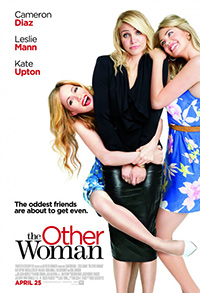Birds of a Feather: Cassavetes’ Brings Generic Chops to Predictable Comedy
 Long before the inevitable denouement of the vainglorious adulterer catalyzing the female frenzied revenge fantasy that is The Other Woman, one will quickly apprehend the fact that it’s not nearly as daringly mature as it would have you think. Sort of like a younger generation’s version of The First Wives Club (1996), time has not advanced the realism of adult sexual discourse in mainstream film, the ritual of appeasing the conservative censorship of the MPAA still bound tightly to the promise of an adolescent profit margin. In a bid to secure a wholly unnecessary PG-13 rating, there’s a trade off as we lose Cameron Diaz’s sole use of the F word (seemingly changed to something like ‘flipping’ in post-production) for its sexual insinuations that can never quite be discussed in frank, real world terms. While it bears the brunt of an omnipresent struggle between its sexual innuendos and towing the line, this saga of the privileged runs a generic and predictable course, despite having likeable chemistry between its female leads.
Long before the inevitable denouement of the vainglorious adulterer catalyzing the female frenzied revenge fantasy that is The Other Woman, one will quickly apprehend the fact that it’s not nearly as daringly mature as it would have you think. Sort of like a younger generation’s version of The First Wives Club (1996), time has not advanced the realism of adult sexual discourse in mainstream film, the ritual of appeasing the conservative censorship of the MPAA still bound tightly to the promise of an adolescent profit margin. In a bid to secure a wholly unnecessary PG-13 rating, there’s a trade off as we lose Cameron Diaz’s sole use of the F word (seemingly changed to something like ‘flipping’ in post-production) for its sexual insinuations that can never quite be discussed in frank, real world terms. While it bears the brunt of an omnipresent struggle between its sexual innuendos and towing the line, this saga of the privileged runs a generic and predictable course, despite having likeable chemistry between its female leads.
Shortly after thinking she’s found the man of her dreams, lawyer Carly Whitten (Cameron Diaz) discovers that her Mark (Nikolaj Coster-Waldau), her boyfriend of the last two months, is married when she accidentally meets his wife, Kate (Leslie Mann). Equally shocked by the revelation, Kate desperately begins to start an ongoing conversation with Carly, eager to share her feelings with the only plausible outlet she has available to her. Eventually, the two women realize they have a lot in common. The discovery of a third affair with a much younger woman (Kate Upton) soon has the three ladies concocting a fitting revenge for the heartbreaking hubby.
Cineastes will always unfavorably compare director Nick Cassavetes with his famed actor/director father, and it’s certainly a hard legacy to live up to (his sisters Zoe and Xan, though less prolific with one directorial feature each, seem less inclined toward mainstream endeavors). The Other Woman is, perhaps, an unfair assessment of his abilities, a studio gig that leaves little room for signature or creative flair (though this could be the same argument for faults in similar fodder, like his most notable title, 2004’s The Notebook). Reuniting with Cameron Diaz, who starred in his 2009 film, My Sister’s Keeper, Cassavetes’ wisest move is letting Diaz and co-star Leslie Mann have free reign, their comic abilities blending amusingly.
The up-tight straight man of the duo, Diaz gets to remind us of where her assets lie after the cringe-worthy turn in last year’s The Counselor. Here she’s a high-flying Manhattan lawyer, though sometimes her work wardrobe is questionable, as in one scene which sees her clothed in a bright red dress and swiftly loosening tresses like some blonde, overblown Hibiscus. In truth, she’s outshone by the sometimes manic Leslie Mann, here relegated to playing an isotope of her more dynamic performance in This is 40. Yet Mann, as she often does, has a knack for spinning banality into comedic gold, and her performance is the brightest spot throughout The Other Woman.
The remaining cast members are all hopelessly one note, from secretary Nicki Minaj (who is dialed down considerably, neither dolled up in clown nor prostitute chic), the blandly conceived Kate Upton, or the douchebag composite of a player as enacted by Nikolaj Coster-Waldau. It’s too bad that the same amount of care afforded the female wardrobe wasn’t extended to other elements of production, such as the achingly pedantic soundtrack.
Three women plotting revenge on a sex partner they all shared hardly seems to evoke Cyndi Lauper’s ‘Girls Just Want to Have Fun.’ But at least we get Lauper’s vocals; poor Pat Benatar’s “Love is a Battlefield” gets a snoozy cover track. As many cases with mainstream cinema, the whiff of missed opportunity haunts the final product. A similar Cameron Diaz vehicle, Bad Teacher was critically reviled back in 2011. Say what you will, at least it dared to address an adult audience.


